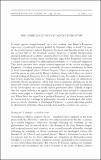Files in this item
The Christian ethics of Dante’s Purgatory
Item metadata
| dc.contributor.author | Corbett, George | |
| dc.date.accessioned | 2016-01-21T12:40:04Z | |
| dc.date.available | 2016-01-21T12:40:04Z | |
| dc.date.issued | 2014 | |
| dc.identifier | 236054584 | |
| dc.identifier | e72a3e87-9c19-41d2-8b2b-8aa4b81d097d | |
| dc.identifier | 84921969997 | |
| dc.identifier.citation | Corbett , G 2014 , ' The Christian ethics of Dante’s Purgatory ' , Medium Aevum , vol. LXXXIII , no. 2 , pp. 266-87 . | en |
| dc.identifier.issn | 0025-8385 | |
| dc.identifier.other | ORCID: /0000-0002-7043-3253/work/27162483 | |
| dc.identifier.uri | https://hdl.handle.net/10023/8055 | |
| dc.description.abstract | Leaving aside the restricted early readership of the Monarchia and the Convivio, it is understandable that the early Dante enthusiasts who commented on his poem, the first of whom included his sons Pietro and Jacopo d'Alighieri, shied away from reading the Commedia in light of this extreme dualism.11 But even much of twentieth-century Dante scholarship, with scarce need to protect Dante's poem in this way, sought nonetheless to limit this dualism to Dante's Latin and vernacular prose works (marginalized as chronologically earlier 'minor works'). [...]Bruno Nardi, a dominant scholar in this tradition, claimed that 'In the Commedia there is no more trace of the "two final ends" of the MonarchiaP2 Kenelm Foster and Etienne Gilson, acute readers of philosophical heterodoxy in Dante's prose works, were still keen to emphasize that 'the Comedy is quite another matter', and that its subject 'is theological - the final aims of man (ultima régna)'P The compositional chronology underlining this view - that Dante's Monarchia represents a dualistic stage in his intellectual trajectory that the poet left behind when he began writing the Commedia - has, however, been systematically refuted by modern philological evidence which dates the Monarchia to the last few years of his life when the greater part of the Commedia was already written. | |
| dc.format.extent | 203871 | |
| dc.language.iso | eng | |
| dc.relation.ispartof | Medium Aevum | en |
| dc.subject | BV Practical Theology | en |
| dc.subject | BDC | en |
| dc.subject.lcc | BV | en |
| dc.title | The Christian ethics of Dante’s Purgatory | en |
| dc.type | Journal article | en |
| dc.contributor.institution | University of St Andrews. School of Divinity | en |
| dc.contributor.institution | University of St Andrews. St Andrews Institute of Medieval Studies | en |
| dc.description.status | Peer reviewed | en |
| dc.identifier.url | http://gateway.proquest.com/openurl?ctx_ver=Z39.88-2003&xri:pqil:res_ver=0.2&res_id=xri:lion&rft_id=xri:lion:ft:abell:R05137132:0 | en |
This item appears in the following Collection(s)
Items in the St Andrews Research Repository are protected by copyright, with all rights reserved, unless otherwise indicated.

